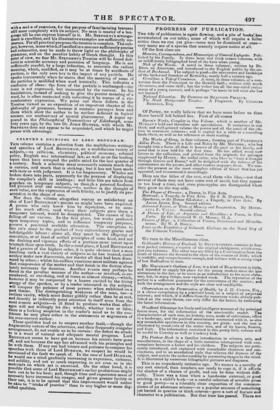COLBURN S OPINIONS OF LORD BROUGHAM.
Tuts volume contains a selection from the multifarious writings and speeches of Lord BROUGHAM, on a multifarious variety of subjects,—as criticism, chemistry, political economy, colonial policy, English and international law, as well us on the leading topics that have occupied the public mind for the last quarter of a century. Such a selection must necessarily contain much that is curious, and much that is striking; but it has not been made with taste or with judgment. It is too fragmentary. Wholes are broken down into parts, apparently for the purpose of displaying the compiler's skill in headings ; and little bits are taken from speeches on temporary subjects, as thou,th a paternal fondness bad presidea over the beim:thing—fox mailer is the thought of such value, nor the expression of such felicity, as to justify its pre- sentation in the shape of aria.
Nor does the volume altogether convey so satisfactory an idea of Lord BROUGHAM'S genius as might have been expected. A person who only knew him by reputation, or by some of his crack efforts, read when their subjects gave them a temporary interest, would be disappointed. The causes of this falling-off are various. In the first place, few works produced upon temporary topics, and to influence temporary purposes,
possess a perennial readable attraction. The exceptions to this rue must be the product of very extraordinary genius and indefatigable labour : above all, they must be the offspring of conviction, or at least of settled principles of some kind, and not the dashing and vigorous effOrts of a partisan more intent upon triumph than upon truth. In the second place, if Lord BROUGHAM had a genius of the highest order, it is quite obvious that a man handling such a vast variety of subjects as lie has treated, could neither make new discoveries, nor master all that had been disco- vered by others ; whilst his endless exertions must militate against that compression of the matter and that finish in the diction abso- lutely necessary for duration. Another reason may perhaps bu found in the peculiar manner of the author—so involved, so en- cumbered, so overdoing, and at times so almost clumsy,—which, however it may be conquered by a hearer excited by the living energy of the speaker, or by a reader interested in the subject, will conquer the patience of most persons when exhibited on a past theme. The distinguishing weakness of the man, too—a restless vanity, which must flutter giddily rather than be at rest, and directly or indirectly point attention to itself even from the most remote subjects—is ill fitted to produce works that after- ages will not willingly let die; whilst, whether true or false, there is a lurking suspicion in the reader's mind as to the con- fidence he may place either in the statements or arguments of his over-earnest author.
These qualities lead us to suspect another fault,—though the fragmentary nature of the selections, and their frequently irregular arrangement, do not enable us to be certain : the defect we allude to is a want of natural and adequate mental progress. Lord BROUGHAM seems to have got on because his seniors have gone off, and not because the age has advanced with his principles and he with them. If any one had leisure and patience to compare his speeches with those of Lord DURHAM, we suspect lie would be convinced of the fault we speak of. In the case of Lord DURHAM, be would see a mind gradually increasing in expansion, richness, and solidity, and not so much improving in art even as in the materials on which art is exercised. On the other hand, it is possible that some of Lord BROUGHAM'S earlier productions might turn out to be his best; and, though time and experience must of necessity have increased his images, and given greater facility in their use, it is to be opined that this improvement would rather be. akin to " tricks of practice" than to any higher or more dig- nified qualities.


























 Previous page
Previous page